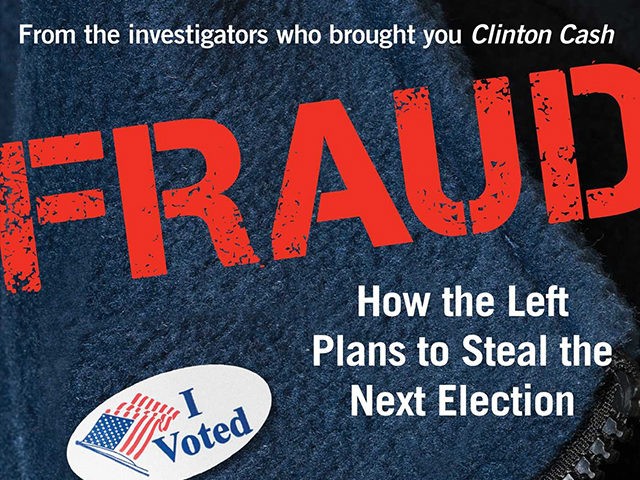What passes for “journalism” today? Washington Post reporter Eli Rosenberg contacted my organization, the Government Accountability Institute, at midnight to comment on an incendiary piece challenging our groundbreaking work on voter fraud. For some strange reason, we were unavailable at that time.
He then promptly published the story at 5:45 a.m., noting that “GAI declined to comment on Tuesday morning.” His actions eliminate even the most charitable interpretations of anything resembling journalistic fairness.
His article is a hit piece posing as a news article. He’s clearly doing the bidding of left-wing activists who are concerned by our data-driven research that demonstrates real evidence of the threat of voter fraud.
The Washington Post’s antics shows that the very forces exposed in my book Fraud: How the Left Plans to Steal the Next Election are frightened by what we’ve uncovered.
Rosenberg cites these activists as “experts” to say voter fraud is not a problem. Who are these “disinterested” experts?
The Post cites Maine Secretary of State Matthew Dunlap as an authority. Dunlap served on President Trump’s Advisory Commission on Election Integrity and last week released documents he claimed showed no evidence of widespread voter fraud.
Case closed? Hardly. First, the story fails to identify Dunlap as a progressive Democrat. It doesn’t mention that Dunlap was accused by other commission members of leaking internal documents to friendly press associates who then favorably reported leaked emails, sometimes within the hour. The article further fails to mention that
Fellow commission member J. Christian Adams, a former Department of Justice Civil Rights attorney and president of the conservative Public Interest Legal Foundation, said Dunlap was actively sabotaging the commission.
“Anyone who was close to the matter [knew he was] on a crusade to satisfy the radical progressives who don’t want any discussion about voter fraud,” Adams said after the commission disbanded under the weight of nineteen lawsuits and legal actions from progressive groups.
Kris Kobach, the commission’s Republican vice chairman, said Dunlap was being “willfully blind to the voter fraud in front of his nose.”
Who are the Post’s other “experts”?
Rosenberg then cites The Brennan Center as an authority.
The Brennan Center is often used by the Post to deliver what’s portrayed as a nonpartisan expert opinion which just so happens to always cut against evidence of voter fraud. I actually have an entire chapter on The Brennan Center in my book. The organization is so left-wing that it thinks 49 states, including California and New York, have voter requirements that are too restrictive!
But who is behind The Brennan Center?
The Brennan Center has received millions of dollars from George Soros’ Open Society Foundations. In 2016 alone, the organization was given $3 million for “organizational support.” Its president, Michael Waldman, is a former speechwriter for President Bill Clinton.
In short, The Brennan Center is hardly a disinterested party. They have a clear political agenda, but you’d never know that from Rosenberg’s story.
The other expert Rosenberg then quotes is Paul Gronke from Reed College in Portland, Oregon.
Is Gronke a disinterested observer?
Gronke currently works with “The Democracy Fund” which was founded by Pierre Omidyar, who has teamed with Soros to fund activist groups like The Brennan Center.
Gronke also works with The Early Voter Information Center, which has partnered with John Podesta’s liberal Center for American Progress in support of Oregon’s automatic voter registration efforts.
But again, you’d never know about any of this from the Washington Post.
My question is this: Couldn’t the Post and Rosenberg find anyone unaffiliated with the man (George Soros) actively undermining American elections to critique our study that exposes the nation’s vulnerabilities?
None of these experts offered substantive critiques of our research except for hyperbolic statements that reinforced their existing bias that voting fraud is not a problem. Nothing to see here!
In our research we used a conservative methodological approach and used Simpatico Software, a Rhode Island based firm that specializes in identifying patterns of fraud within large data systems for state and local health agencies.
But as I point out in my book, the story of voter fraud is not just academic studies, but hundreds of cases across the country, exposed by lawyers on the ground and local media outlets.
Only by looking there can you discover the story of the “granny farmer” who preys on senior citizens’ absentee ballots and was caught with notebooks detailing the systemic payments and targeting of vulnerable voters.
Or the story of of the undercover New York investigators who successfully impersonated illegal voters 61 out of 63 times, stifled only when the mother of the felon the investigator was impersonating was working the polling place.
Or the fact that non-citizens and felons are the ones repeatedly victimized by the vulnerabilities the left fights to keep in place, where well intentioned immigrants accidentally violate the law by registering and voting, imperiling their ability to become citizens or even stay in the country.
But again, you’d never know any of that by reading the Washington Post. Our country’s voters, and its vulnerable populations deserve better.


COMMENTS
Please let us know if you're having issues with commenting.